| 15 September |
• yesterday • tomorrow |
| Memorial of Our Lady of Sorrows |

Fifth of six children. Educated at Avellino and Naples in Italy. Studied philosophy at the Gregorian University in Rome, Italy. Seminarian at the Theology Seminary of the Institute for Foreign Missions at Milan, Italy. Ordained on 19 May 1894 at Milan.
Missionary to Toungoo, Eastern Burma (modern Myanmar), setting sail on 27 September 1895. Worked in Burma until 1907 when his failing health forced his return to Italy. From there he spent the rest of his life encouraging clerical and lay missionaries through his writing, his work, his preaching. Director of Le Missioni Cattoliche in 1909. Started the publication of Propaganda Missionaria, a popular broadsheet newspaper, in 1914. Founded the Missionary Union of the Clergy in 1916, created with the idea of spreading missionary zeal throughout the faithful. Founded Italia Missionaria for young people in 1919. Founded Sacred Heart Seminary at Ducenta, Caserta, Italy in an effort to foster missionary vocations in southern Italy.
Superior General of the Institute of Foreign Missions of Milan in 1924 which in 1926 was joined by Pope Pius XI to the Missionary Seminary of Rome to create the Pontifical Institute for the Foreign Missions (P.I.M.E.). Worked from 1934 to 1936 for help found the Misssionary Sisters of the Immaculate, an offshoot of the P.I.M.I. Headed the International Secretariat for the Missionary Union of the Clergy from 1937 to 1941. Superior of the Italian Southern Province of P.I.M.E. in 1943. Publisher of the family missionary magazine Venga il tuo regno in 1943. Wrote in support of missionaries, developed techniques which have become standard today, and though he was tied to a desk in southern Italy, he worked as a missionary throughout his life.
16 January 1872 at Avellino, Italy
• 15 September 1952 at Naples, Italy of natural causes
• buried at the seminary in Ducenta, Italy
4 November 2001 by Pope John Paul II
All the Church for all the World! - Blessed Paolo
We missionaries often wonder why the work of the conversion of the non-Christian world goes so slowly. We usually give various reasons to explain this painful fact, and in truth the problem may be considered from many angles, some of which do not concern our responsibility. But for the part that does concern us, and it is the main part, the problem has a very clear solution. To save the world, God in his infinite wisdom wanted to have co-workers. God does his part well: do the people called to help him do their part equally well? Let us work in such a way that the whole Church, all Christian people, led by their bishops and clergy, truly feel the apostolic duty that is incumbent upon them to promote the propagation of the faith with every means. Let us work in such a way that that missionaries, the most direct instruments for the conversion of souls, are saints, and non-Christians will not be slow to be converted. The missionary problem has been, and still is almost ignored by the Christian people. Those who were interested in the past were always a minority, and it is extremely painful to see today too, although some progress has been made, how the enormous question is far from being understood and faced fully by clergy and people. It is extremely painful, because Catholic peoples would have more than enough energies to promote the work of evangelization more worthily if priests taught, organised and above all inflamed them with a greater spirit of faith and zeal. Missionaries, also from the human viewpoint, have been excellent people...but neither brilliance nor prudence, nor courage have made them great in our eyes and the eyes of God. They have been great, they have saved many souls, they have founded Churches, mainly because they were holy men, that is, spiritual men. This is the secret, the soul of their zeal, their perseverance and their success; this is the solemn teaching they have handed down to us and which I love to remind you of, so that our missionaries of today and those of tomorrow may always build upon it the first and essential reason for their own sanctification and the sanctification of the souls that are, and will be entrusted to them. You, missionaries in active service in the field, are particularly concerned with your part of cooperation. Therefore I say to you: be holy missionaries by following the footsteps of those great missionaries who went before you and, for the part that concerns you, your apostolic duty will have been done to the full. The souls the Lord in his merciful designs has entrusted to each one of you that you may lead them to salvation, will be saved and at the end of your days you will be able to say with the Divine Redeemer: "(Father) I kept those you had given me true to you name. I have watched over them and not one is lost" (John 17:12)." - Blessed Paolo
https://catholicsaints.info/blessed-paolo-manna/
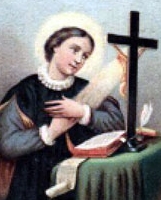
• Apostle of Purgatory
• Caterina Fieschi Adorno
• Caterina of Genoa
• Caterinetta
Daughter of Jacopo Fieschi and Francesca di Negro, Geonese nobles; she was related to Pope Innocent V and Pope Adrian V, and her father became viceroy of Naples, Italy. Youngest of five children. A pious and prayerful girl, she early felt a call to religious life, tried to enter a convent at age 13, was turned away because of her youth. At 16 she entered into an arranged marriage with a young Genoese nobleman, Giuliano Adorno. They were a childless couple, he was careless and unsuccessful as a husband and provider, often cruel, violent and unfaithful, and reduced them to bankruptcy. Catherine became indifferent to her faith, and fell into a depression.
In 1473, while going to Confession in a convent in Genoa, Catherine was struck down by a vision, the revelation of God's love and her own sinfulness, and fell into a religious ecstasy; her interior state, and her contact with the truth she had received in the vision, stayed with her the rest of her life. She returned home, helped lead her husband to the faith, and the two lived together chastely the rest of their lives, working with the sick and poor till the death of Julian in 1497. She became a Franciscan tertiary, serving as a tertiary directress in 1490. Caught and survived the plague in 1493. Spiritual student of Father Cattaneo Marabotti in 1499, and he helped her to write and arrange descriptions of what she had seen and learned in her visions. It is her writings that have continued her fame today; during her canonization inquiry, the Holy Office announced that her writings alone were enough to prove her sanctity. Online and downloadable versions are linked below.
1447 at Genoa, Italy as Caterina Fieschi Adorno
15 September 1510 at Genoa, Italy of natural causes
6 April 1675 by Pope Clement X
16 June 1737 by Pope Clement XII
• against adultery; victims of adultery or unfaithfulness
• against temptation
• brides
• childless people
• difficult marriages
• people ridiculed for their piety
• widows
• Life and Doctrine of Saint Catherine of Genoa
• Spiritual Dialogue
• Treatise of Discretion
• Treatise of Divine Providence
• Treatise on Prayer
• Treatise on Purgatory
If it were given to a man to see virtue's reward in the next world, he would occupy his intellect, memory and will in nothing but good works, careless of danger or fatigue. - Saint Catherine of Genoa
https://catholicsaints.info/saint-catherine-of-genoa/
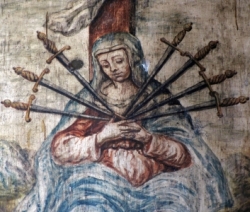
• Beata Maria Virgo Perdolens
• Beata Vergine Addolorata
• Dolorosa
• Maria Santissima Addolorata
• Mater Dolorosa
• Mother of Sorrows
• Our Lady of the Seven Dolours
• Our Lady of the Seven Sorrows
• Sorrowful Mother
Names by which the Blessed Virgin Mary is referred to in relation to sorrows in her life
• The Prophecy of Simeon over the Infant Jesus (Luke 2:34)
• The Flight into Egypt of the Holy Family (Matthew 2:13)
• The Loss of the Child Jesus for Three Days (Luke 2:43)
• The Meeting of Jesus and Mary along the Way of the Cross (Luke 23:26)
• The Crucifixion, where Mary stands at the foot of the cross (John 19:25)
• The Descent from the Cross, where Mary receives the dead body of Jesus in her arms (Matthew 27:57)
• The Burial of Jesus (John 19:40)
• Archconfraternity of Christian Mothers
• Congregation of the Holy Cross
• Slovakia
• Mississippi, USA
• 13 cities
• heart surrounded by a wreath of roses and transfixed by a sword
• heart with seven swords, emblematic of the Seven Sorrows
https://catholicsaints.info/our-lady-of-sorrows/

Married laymen in the archdiocese of Antequera-Oaxaca, Mexico. Catechists. Martyred for refusing to worship idols.
• c.1660 - 1663 in San Francisco Cajonos, Oaxaca, Mexico
• member of the Zapotec Indians
hacked to death by a mob on the evening of 15 September 1700 in San Francisco Cajonos, Oaxaca, Mexico
• 1 August 2002 by Pope John Paul II
• beatification recognition celebrated at the Basilica of Our Lady of Guadalupe in Mexico City, Mexico
https://catholicsaints.info/blessed-jacinto-de-los-angeles/
https://catholicsaints.info/blessed-juan-bautista/
Achard, Achart, Aicard, Aichard
Son of a military officer in the court of King Clotaire II. Educated at a monastery in Poitiers, France. Destined by his father for the military, Aichardus felt a call to the religious life. His mother convinced the rest of the family to give him a choice, and he became a monk at Saint Jouin abbey, Ansion, Poitou (in modern France) for 39 years. Prior of Jumièges Abbey. Abbot of Jumièges, a house with 900 monks where his strict personal observance of the Order's rule set an example that rippled through the rest of the house.
Poitiers, France
687 at Jumièges Abbey of natural causes
angel touching monks with a staff
https://catholicsaints.info/saint-aichardus/
• Mirin of Benchor
• Mirin of Paisley
• Meadhran, Merinus, Merryn, Mirren
Spiritual student of Saint Comgall of Bangor. Monk. Evangelized the area of Strathclyde, Scotland. Founded Paisley Abbey in Paisley, Renfrewshire, Scotland, and served as its first abbot. He is venerated in Ireland and Scotland, and in the Orthodox tradition.
c.565 in Ireland
• c.620 of natural causes
• his shrine at the Paisley abbey became a pilgrimage site
• Paisley, Scotland, city of
• Paisley, Scotland, diocese of
• Saint Mirren Football Club
https://catholicsaints.info/saint-mirin-of-bangor/

Orlando
Born to the famous de Medici family. At around age 30, he retired from the world to live as a hermit in the Alpine forests.
c.1330 in Milan, Italy
• 15 September 1386 of natural causes
• buried at the Church of the Holy Church Busseto, Italy
25 September 1853 by Pope Pius IX (cultus confirmation) after a canonization process that lasted nearly 300 years
man in goatskin as for many years that was all he had to wear
https://catholicsaints.info/blessed-rolando-de-medici/
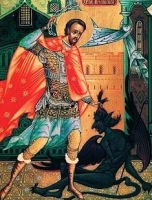
Convert, brought to Christianity by the missionary and translator Ulphilas. Martyred in the persecutions of King Athanaric.
4th-century Goth territory north of the Danube River
• burned alive c.370 on the banks of the Danube River
• relics enshrined in Mopsuestria, Cilicia (in modern Turkey) on 15 September 375
• left arm enshrined in the 12th century abbey of Saint Nicetas in Melendugno, Lecce, Italy
Melendugno, Lecce, Italy
https://catholicsaints.info/saint-nicetas-the-goth/
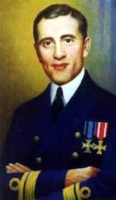
• Ladislao
• prisoner 21223
Priest in the military ordinariate of Poland. Military chaplain. Deported, imprisoned, tortured and martyred in the Nazi persecutions.
30 September 1892 in Samborzec, Swietokrzyskie, Poland
15 September 1942 in the prison camp at Dachau, Oberbayern, Germany
13 June 1999 by Pope John Paul II
https://catholicsaints.info/blessed-wladyslaw-miegon/

Bishop of Palermo, Sicily. Because Mamillian stood for orthodox Christianity, the Arian King Genseric exiled him to Tuscany, Italy.
• 460 in the Tuscany region of Italy
• relics later translated to Palermo, Sicily
• some relics later transferred to the church of San Maria Monticelli in Rome, Italy
• some of those relics later transferred to Spoleto, Italy
https://catholicsaints.info/saint-mamillian-of-palermo/

Ordained in 1875 in the archdiocese of Vienna. Founder of the Congregation of Christian Workers of Saint Joseph Calasanz at Vienna on 24 November 1889.
28 February 1852 in Baden, Vienna, Austria
15 September 1929 in Vienna, Austria of natural causes
21 June 1998 by Pope John Paul II
https://catholicsaints.info/blessed-anton-maria-schwartz/
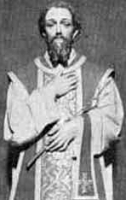
Priest in Rome, Italy. Arrested for helping martyrs, and for giving them Christian burial. Martyred.
• beaten to death with clubs c.71 at Rome, Italy
• his catacomb is on the Via Nomentana, Rome, under the grounds of the Villa Patrizio
• some relics transferred to Milan and Parma in Italy
https://catholicsaints.info/saint-nicomedes-of-rome/
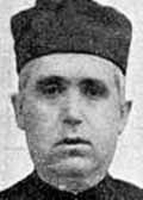
Priest in the archdiocese of Valencia, Spain. Martyred in the Spanish Civil War.
3 January 1894 in Montaverner, Valencia, Spain
15 September 1936 in Cárcer, Valencia, Spain
11 March 2001 by Pope John Paul II
https://catholicsaints.info/blessed-pascual-penades-jornet/
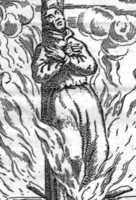
Giovanni Battista Costanzo
Jesuit priest. Missionary to Japan. Martyr.
1571 in Bovalino, Reggio Calabria, Italy
burned to death on 15 September 1622 in Tabira, Nagasaki, Japan
7 May 1867 by Pope Pius IX
https://catholicsaints.info/blessed-camillus-costanzo/
Christian woman in a time persecution by emperor Antoninus Pius and governor Antiochus, she was twice taken into pagan temples and ordered to make sacrfices to idols; the idols would topple over. Her captors gave up, tortured and then executed her. Martyr.
• beheaded in the 2nd century at Marcianopolis, Thrace (in modern Greece)
• relics enshrined on Lemnos Island in the Aegean Sea
https://catholicsaints.info/saint-melitina/
Aper, Apre, Apro, Epvre, Evre
Lawyer, known for his skill, integrity and devotion to justice. He gave up his profession to became a priest. Bishop of Toul, France.
near Trier, Gaul (in modern Germany)
• 507 of natural causes
• interred in the basilica in Toul, France
https://catholicsaints.info/saint-aprus-of-toul/
Tommasuccio of Nocera
Franciscan friar. Noted preacher in the Italian regions of Tuscany and Umbria.
1319 in Nocera, Italy
• Foligno, Italy of natural causes
• buried in the Franciscan church of Sant Agostino in Foligno
https://catholicsaints.info/blessed-tommasuccio-of-foligno/
Emile
Deacon. Friend of and fellow student with Saint Jeremias at Cordova, Spain during a time when the city was under Moorish control. The two were very open about their Christianity. Martyred in the persecutions of Caliph Abderrahman.
beheaded in 852 in Cordova, Spain
https://catholicsaints.info/saint-emilas-of-cordoba/
Jeremy
Friend of and fellow student with Saint Emilas at Cordova, Spain during a time when the city was under Moorish control. The two were very open about their Christianity. Martyr.
beheaded in 852 in Cordova, Spain
https://catholicsaints.info/saint-jeremias-of-cordoba/
Companion of Saint Photinus of Lyon. Arrested for his evangelism work, he escaped prison, went to Tournus in eastern France, resumed his preaching, and was soon arrested again. Martyr.
beheaded in 178 in Tournus, France
https://catholicsaints.info/saint-valerian-of-tournus/
An actor who, while performing in a play that mocked baptism, suddenly declared himself a Christian. Julian the Apostate was in the audience, was not amused, and had Porphyrius murdered on the spot. Martyr.
362
https://catholicsaints.info/saint-porphyrius-the-martyr/
• Aubin of Lyon
• Alpin of Lyon
Bishop of Lyon, France from 381 to 390. Built the Saint Stephen Cathedral there.
• c.390
• buried in Lyon, France
https://catholicsaints.info/saint-albinus-of-lyon/
Heman
Fled from Britain to Brittany to escape the Anglo-Saxon invasion. Hermit at Loc-Harn, which was named after him.
6th century Britain
Loc-Harn, Brittany, France
https://catholicsaints.info/saint-hernan/
Baldo, Baldus
Convert. Spiritual student of Saint Artemius of Sens. Hermit in Sens, France.
Spain
7th century
https://catholicsaints.info/saint-bond-of-sens/
Monk. Abbot of Saint-Valèry-sur-Somme, France. May have been a bishop in the Normandy and Picardy areas of modern France.
7th century
https://catholicsaints.info/saint-ribert/
Abbot of Alavendi, Georgia. Disciple of Saint John Zedazneli.
Syria
c.590
https://catholicsaints.info/saint-joseph-abibos/
Benedictine monk near Bergamo, Italy. Spiritual student of Saint Albert.
1095
https://catholicsaints.info/saint-vitus-of-bergamo/
Monk and then abbot of a monastery in Varennes, France.
c.690
https://catholicsaints.info/saint-ritbert-of-varennes/
Holy 5th century widow in Auvergne, France.
https://catholicsaints.info/saint-eutropia-of-auvergne/
Three Christian men martyred together in the persecutions of Maximian - Asclepiodotus, Maximus and Theodore.
310 at Adrianopolis (Adrianople), a location in modern Bulgaria
https://catholicsaints.info/martyrs-of-adrianopolis/
Four Christian men martyred together, date unknown - Gordian, Macrinus, Stratone and Valerian.
Noviodunum, Lower Moesia (near modern Isaccea, Romania)
https://catholicsaints.info/martyrs-of-noviodunum/
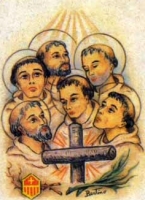
A group of six Mercedarians who were captured by Moors near Valencia, Spain and taken to Morocco. Though enslaved, they refused to stop preaching Christianity. Martyrs. - Dionisio, Francis, Ildefonso, James, John and Sancho.
crucified in 1437 in Morocco
https://catholicsaints.info/mercedarian-martyrs-of-morocco/
• Charles of Montegranelli
• Cristiano da Perugia
CatholicSaints.Info Portable Edition